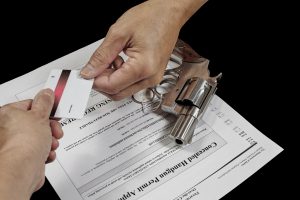
With major mass shootings like the events at the Century movie theater in Aurora, Colorado and the Sandy Hook Elementary School in Newtown, Connecticut, gun legislation is at the forefront of many political platforms. In New Jersey, the Graves Act is a piece of legislation put into effect to impose stricter penalties on those involved in crimes that were committed with firearms. This includes both unlawful possession of a firearm and possession of firearms by people who are banned by law from owning and having weapons in their possession.
In 2008 amendments were added to the law to extend its reach on what crimes it could be applied to. The Graves Act can even apply to something as simple as unlawful possession of a BB gun, which in New Jersey is considered a real firearm, and therefore requires a license to possess and own. The Graves Act can also apply to people who legally purchased a firearm in another state and come into New Jersey carrying those weapons. These same people might find themselves in trouble with New Jersey police if they travel with their firearm in the vehicle unaware of the gun laws that the state has put in place.
What Crimes Does the Graves Act Apply to?
When the Graves Act was made it was designed to prosecute those involved in robbery, burglary, or aggravated assault and required mandatory imprisonment and ineligibility for parole. In 2008 however the law was amended and the list of offenses that the Graves Act applied to drastically increased.
Violations that now apply include unlawful possession of a machine gun, handgun rifle or shotgun; possession of a sawed off shotgun or defaced firearm and violations of rules on those who were banned from possessing firearms. Being found guilty under any of the above charges will result in you having to serve at least 1/3 of your prison term without parole. Unlawful possession of a firearm under the Graves Act calls for at least 3 years in prison with a maximum sentence of 5 years without parole.
Avoiding a conviction under the Graves Act is very difficult to achieve. Hiring an experienced criminal defense attorney to handle your case can help you potentially have serious charges and penalties dropped.
Who Should I Contact?
The right attorney can be the difference in having the prosecutor reduce the mandatory sentence or have it completely waived. The prosecutor will only consider doing so after evaluating the totality of the circumstances, such as having a prior record, whether there were victims, and how the weapon was obtained. If you are facing charges under the Graves Act, an experienced NJ criminal defense attorney can help you effectively present your case and negotiate a more favorable outcome. Call Rosenblum Law today at 888-815-3649 for a free consultation!

